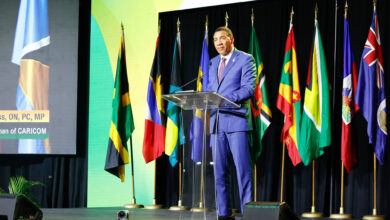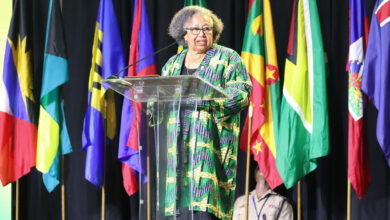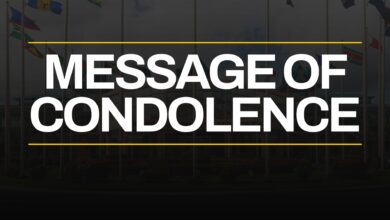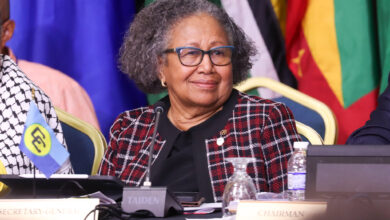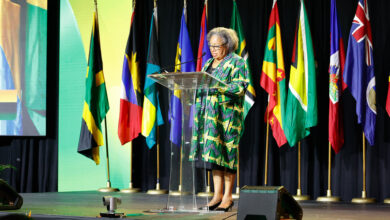The Second Meeting of the Council for Foreign and Community Relations (COFCOR) was held in Basseterre, St. Kitts and Nevis on 13-14 May 1999.
The Ministers attending were: the Hon. Hilroy Humphreys, Minister of Trade, Commerce and Business Development, Antigua and Barbuda; the Honourable Billie Miller, Deputy Prime Minister and Minister of Foreign Affairs and Foreign Trade, Barbados; the Honourable John Briceño, Deputy Prime Minister and Minister of Natural Resources and the Environment, Belize; the Honourable Mark Isaac, Minister of State in the Ministry of Foreign Affairs, Grenada; Honourable Clement J. Rohee, Minister of Foreign Affairs, Guyana; Dr. the Honourable Denzil Douglas, Prime Minister and Minister of Foreign Affairs, St Kitts and Nevis; the Honourable Jon Odlum, Acting Minister of Foreign Affairs, Saint Lucia; the Honourable Allan Cruickshank, Minister of Foreign Affairs, St Vincent and the Grenadines; the Honourable Errol G. Snijders, Minister of Foreign Affairs, Suriname; the Honourable Ralph Maraj, Minister of Foreign Affairs, Trinidad and Tobago.
Also representing their respective countries were: Mr Irwin La Rocque, Permanent Secretary in the Ministry of Foreign Affairs, Trade and Marketing, Dominica; and His Excellency Stafford Neil, Permanent Secretary, Ministry of Foreign Affairs, Jamaica.
Haiti was represented by the Honourable Fritz Longchamp, Minister of Foreign Affairs.
OPENING CEREMONY
In his statement at the Opening Ceremony, the Secretary-General of the Caribbean Community highlighted the fact that the position of small states today was more precarious than ever, thus making the work of the COFCOR vital. “It is our pilot in the stormy sea of international relations. That sea has become not less stormy but more so with the globalisation and liberalisation of world economic trade relations.”
In his statement, the Hon. Errol Snijders, Minister of Foreign Affairs of Suriname indicated that “active participation in the global processes — to look after our own interests — would and still will realize our common commitment to the development of our nations.”
The Surinamese Foreign Minister further added “Let the ruling on the banana issue therefore be an eyeopener to us and the current lobbying process that is being undertaken by our respective Heads and Ministers, serve as a test case of the genuine willingness of the World Trade Organisation (WTO), the USA and Europe when it comes to the well-being of our peoples. We must vigorously respond to these threatening developments.”
In his Remarks, Dr. the Hon. Denzil Douglas, Prime Minister of St. Kitts and Nevis and Chairman of the COFCOR said that this meeting was taking place against a background of regional and international conflicts and challenges and that the Region’s aim must be “to hew to the principle of human dignity as the sine qua non for the resolution of international conflicts and challenges.”
Prime Minister Douglas called for the establishment of a Department in the WTO to address the economic problems of small nation states, noting that the economies of small states pose unique problems and were especially vulnerable to changes in the global economy.
The Foreign Minister of St. Vincent and the Grenadines, the Honourable Allan Cruickshank, in his statement, noted the inequity in the application of the rules of the game in the international arena and called on his colleague Ministers to strengthen their commitment to the collective approach by the Region in its foreign policy.
THE INTERNATIONAL ENVIRONMENT
The Ministers expressed concern about the effect of trade liberalisation on preferential arrangements enjoyed by CARICOM States, and were particularly dismayed at the full implications of the WTO decision on the EU Banana Import Regime.
The Ministers noted the initiatives being proposed by the international community for debt relief. They also noted the reverbations of the Asian financial crisis on economies in various parts of the world. They recognised the need for measures which would reduce the spread and impact of such developments when they occur. In that context, they welcomed the initiative taken by the IMF to establish an Anti-Contagion Fund. They also recognised the need for infusions of foreign direct investment to help offset the pronounced decline in development assistance.
THE KOSOVO CRISIS
The Ministers registered the Community’s gravest concern at the continuing tragedy in Kosovo.
They noted with alarm the continuing reports of ethnic cleansing of the Kosovo Albanians. They were extremely distressed at the profound suffering and massive displacement of hundreds of thousands of civilians and the impact which this displacement was having on neighbouring states.
They also expressed regret at the tremendous loss of life, including those not directly involved in the conflict.
As a community of small states, CARICOM has always opposed the use of force without authorisation by the UN Security Council and advocated the use of multilateral institutions for the resolution of conflicts, and reiterated the firm adherence of CARICOM countries to the principles enshrined in the UN Charter.
The Ministers therefore urged all parties involved in the Kosovo conflict to pursue an urgent and negotiated solution to the crisis.
EXTERNAL NEGOTIATIONS
The Meeting reviewed progress to date in the three sets of External Negotiations – Post Lomé Arrangements, WTO and the FTAA in which the Region is involved. The discussions focussed on the Region’s preparations for the ACP-EU Ministerial Negotiating Meeting in Brussels in July, 1999; the FTAA Ministerial in Toronto in November, 1999 and the WTO Ministerial in Seattle in November.
CARICOM preparations for the upcoming WTO Negotiations were prominent in the discussions. Key issues for CARICOM would be the Built-In Agenda Items (Agriculture and Services), The `Singapore Issues’ – Government Procurement, Investment, and Competition Policy – and the Treatment of Small Economies in the WTO.
The issue of business facilitation measures in the FTAA process was reviewed and the status of the negotiations in this area was discussed.
BANANAS
The Ministers reviewed the initiatives which have been taken to implement the strategy developed by Heads of Government in Santo Domingo to advance the interests of the Caribbean Banana Exporting Countries in the wake of the World Trade Organisation (WTO) ruling against the European Union Banana Import Regime. They noted the Intention of the European Commission to submit new proposals to the Council by 31 May 1999. The Ministers strongly advocated the need to intensify the consultations with the major interests in the next two weeks.
The Ministers also welcomed the reassurance of the European Commission that it will continue to take account of its obligations to the ACP and was prepared to enter into consultations with all concerned parties. They expressed their appreciation for the continued support of the European Union and pledged to continue to work closely with the Commission in the effort to further reform the regime.
REVIEW OF MEDIUM-LONG-TERM STRATEGY ON FOREIGN POLICY COORDINATION
The Ministers focused their attention on the Region’s medium to long term strategy with respect to foreign policy coordination. In this review, attention was focused on the Region’s relations with countries with which it had traditionally engaged as well as opportunities for the development of new friendships and alliances. They also recognised the need to examine the political realities of globalisation and the FTAA process. They noted the need to focus on refining the political vision for the Twenty-First century vis-à-vis the main trends in current international relations.
The Ministers agreed to the further refinement of a strategy as an urgent task of the Community.
UNITED STATES OF AMERICA
The Ministers reviewed the Region’s cooperation with the USA – within the framework of the Bridgetown Accord – Partnership for Prosperity and Security, in keeping with the call made by the Conference of Heads of Government at its Tenth Inter-Sessional Meeting in Suriname in March 1999. They agreed that it was important to engage in early discussions with the US Secretary of State on the state of the cooperation and to discuss comprehensively issues of critical concern to the Caribbean and the USA. They were prepared to host the Meeting in the Caribbean.
THE EUROPEAN UNION/LATIN AMERICA
AND CARIBBEAN SUMMIT
The Ministers reviewed preparations for the European Union/Latin America/Caribbean Summit which is scheduled to be held in Rio de Janeiro on 28-29 June 1999.
They stressed the importance of this Summit to the continued engagement between Europe and Latin America and the Caribbean. They acknowledged that the Summit would provide an opportunity for the Region to further its interest in a forum of developed and developing countries.
LATIN AMERICA
The Ministers reiterated the importance of developing closer relations with the countries of Latin America. They reiterated the adherence of their countries to the principle of sovereign equality of states. They expressed the hope that, as they continued to engage in dialogue with the countries of Latin America, this principle, so cherished by the Region, would be underscored and supported by all.
THE ASSOCIATION OF CARIBBEAN STATES (ACS)
The Ministers reiterated the support expressed by CARICOM Heads of Government to the work of the ACS at the II Summit of that Organisation. They committed themselves to ensuring that their respective countries actively participate in the deliberations and programmes of the ACS.
They recognised that, although some changes would need to be made to the programmed activities of the ACS reflecting new proposals made at the II Summit, the focus of the ACS would remain Tourism, Trade and Transport.
THE UNITED NATIONS
The Ministers noted that the VII Meeting of the Commission on Sustainable Development was convened in New York over the period 18-30 April, 1999 in order to, inter alia, prepare for the Special Review Session of the United Nations General Assembly (UNGA) on the Small Island Developing States (SIDS).
The Ministers expressed their continuing concern at the position now adopted by the donor community regarding support in the areas identified in the Barbados Programme of Action. They were particularly concerned that assistance in the area of Human Resource Development (HRD) seemed no longer forthcoming.
The Ministers therefore appealed to the international community to adhere to the undertakings reached in Barbados in 1994 in support of the SIDS.
THE ENVIRONMENT AND THE CARIBBEAN SEA
The Ministers accepted the recommendations of the Working Group established by the COFCOR to have the Caribbean Sea internationally recognised as a Special Area in the context of Sustainable Development. They noted that support for the Proposal was provided by the ACS membership at the II Summit of Heads of State and Government of that Organisation.
They pledged to continue the leadership role begun by CARICOM with regard to the Proposal within the framework of the ACS, and in particular the ACS Special Committee on the Conservation and Preservation of the Caribbean Sea.
They called on all the countries of the Caribbean to support the ACS as it seeks to further develop and promote the Proposal at the international level.
HAITI
The Ministers welcomed the report by the Minister of Foreign Affairs of Haiti on the positive developments which had occurred in Haiti, in particular the appointment of a new political administration.
They reiterated that the Region would lend support to Haiti as it seeks to consolidate its hard won democracy.
BELIZE/GUATEMALA
The Ministers encouraged the efforts of the Governments of Belize and the Republic of Guatemala to resolve their differences by peaceful means consistent with the principles of good neighbourliness, mutual respect for sovereignty, and adherence to international law.
They reaffirmed their full support for the territorial integrity and sovereignty of Belize, urging continued dialogue at the political level, and renewed efforts to enhance relations through cooperation in areas of mutual interest.
GUYANA/VENEZUELA
The Ministers took note of the existing good relations between Guyana and Venezuela. In this regard, they welcomed the recent visit to Guyana by the Minister of Foreign Affairs of Venezuela, Dr. Jose Vicente Rangel for the Establishment and Inaugural Meeting of a High Level Bilateral Commission which covers a wide range of areas of cooperation.
They anticipated that the implementation of the Work Programme of this Bilateral Commission would contribute in a significant and positive manner to the enhancement of functional cooperation between the two countries.
The Ministers noted that the discussions under the aegis of the United Nations Secretary- General were proceeding in a cordial and positive atmosphere.
They reaffirmed their support for the territorial integrity and sovereignty of Guyana and reiterated their commitment to the peaceful settlement of the Guyana/ Venezuela controversy.
APPRECIATION
The Ministers expressed their appreciation to the Government and People of St. Kitts and Nevis for the excellent arrangements and the warm and friendly hospitality offered to them for their Meeting. They agreed that these arrangements greatly contributed to the timeliness of their discussions and the success of their deliberations.
DATE AND VENUE
The Ministers accepted the offer of the Government of Trinidad and Tobago to host the Third Meeting of the COFCOR in that country on 8-9 May 2000.
Basseterre, St. Kitts and Nevis
14 May 1999

